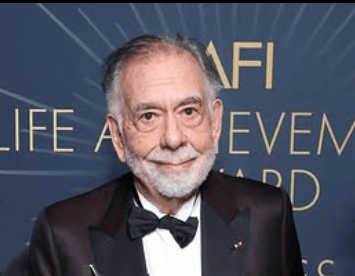As complex as his films, Francis Ford Coppola’s financial narrative demonstrates how innovation and business can remarkably support one another. His $400 million net worth in 2025 is not just a result of box office receipts; rather, it tells a story that is remarkably similar to how dynasties are established—step by step, risk by risk, and vision by vision.

The foundation of his creative and financial legacy is the Godfather trilogy. In addition to winning accolades, these movies solidified Coppola’s status as one of the most significant filmmakers of his time. Their accomplishments were incredibly successful in giving him the flexibility and power to take on endeavors that others might have shunned. In addition to captivating audiences, the sprawling tale of the Corleone family redefined the possibilities of cinematic storytelling and left a lasting cultural impact.
Francis Ford Coppola – Biography and Career Overview
| Category | Information |
|---|---|
| Full Name | Francis Ford Coppola |
| Date of Birth | April 7, 1939 |
| Age (2025) | 86 years |
| Birthplace | Detroit, Michigan, USA |
| Nationality | American |
| Occupation | Film Director, Producer, Screenwriter, Entrepreneur |
| Best Known For | The Godfather Trilogy, Apocalypse Now, The Conversation |
| Net Worth | $400 million |
| Residence | Napa Valley, California |
| Spouse | Eleanor Coppola (m. 1963) |
| Children | Sofia Coppola, Roman Coppola, Gian-Carlo Coppola (deceased) |
| Other Ventures | Wineries, Resorts, Zoetrope All-Story Literary Magazine |
| Reference |
Despite being primarily a director, Coppola has had a very diverse career. He has alternated between writing, producing, and directing on a regular basis, with each position supporting the others. Coppola’s ability to recognize potential was demonstrated when he produced American Graffiti, which aided George Lucas in launching his career. His pen was as strong as his camera, as demonstrated by his work on screenplays for Apocalypse Now and The Godfather. His professional life was extremely efficient due to this combination of abilities, producing both financial gain and artistic recognition.
One notable example of innovation is the move into winemaking. In 1975, Coppola bought the Niebaum estate in Napa Valley with the money he made from The Godfather. It appeared to be a side project at the time, but it eventually became a successful empire. He showed tenacity even when financial difficulties surfaced in the 1990s. He obtained the money to increase his winery holdings by consenting to direct Bram Stoker’s Dracula. These days, Inglenook and Francis Ford Coppola Winery stand for not only prosperous companies but also incredibly resilient brands that are based on organic farming and immersive experiences. His forays into Oregon broaden this empire even more, demonstrating that his intuition is still remarkably acute.
Another key to his success was the hospitality sector. Coppola introduced luxurious experiences that were surprisingly affordable for tourists looking for exclusivity and authenticity through resorts like Belize’s Blancaneaux Lodge. Celebrities like Brad Pitt and Robert De Niro would later follow suit in their hospitality endeavors, as these properties received widespread praise for their sustainability as well as their charm.
Megalopolis, his most recent artistic risk, perfectly captures his unwavering ambition. The film, which was largely financed by his own wealth, serves as a reminder of his artistic audacity as well as a declaration of independence. The film, which stars Adam Driver and Giancarlo Esposito, explores themes that seem especially current: visionary leadership and urban corruption. Coppola’s readiness to risk his own money demonstrates a confidence that is remarkably clear in its intent: art before commerce, regardless of whether it turns out to be a classic or a contentious endeavor.
His story has always revolved around family ties. Since 1963, he and Eleanor have been married, a remarkable partnership that has survived both successes and setbacks. Although his son Gian-Carlo’s tragic death at a young age left an irreversible scar, his other children, Sofia and Roman, have continued his artistic vision. There is a legacy of talent evident in Roman’s work with Wes Anderson and Sofia’s Academy Award victory for Lost in Translation. When you combine this with members of the extended family like Jason Schwartzman and Nicolas Cage, the Coppola name becomes a very resilient cultural brand.
Coppola’s life has had an impact that goes well beyond his businesses and family. His movies altered stories about morality, loyalty, and identity, changing viewers’ perceptions of conflict and power. Others in creative industries have been encouraged to diversify their portfolios by his wineries and resorts, which demonstrate how artistic sensibilities can be integrated into business. The way that people view how filmmakers can make a living outside of Hollywood’s unstable studio system has significantly improved as a result of this fusion of art and entrepreneurship.
